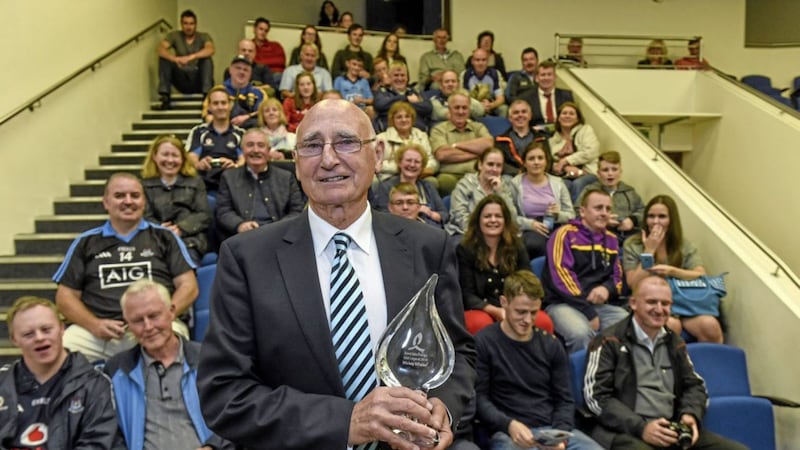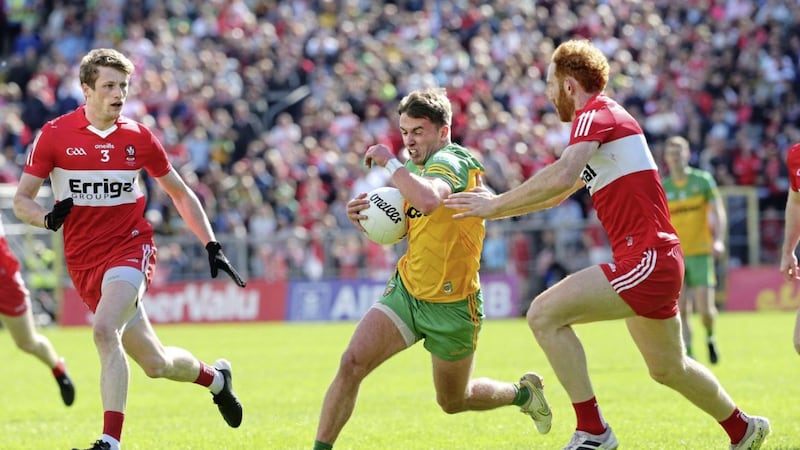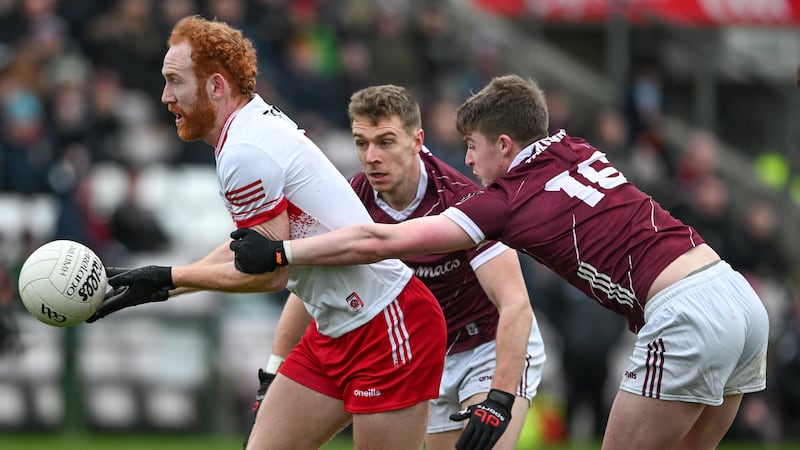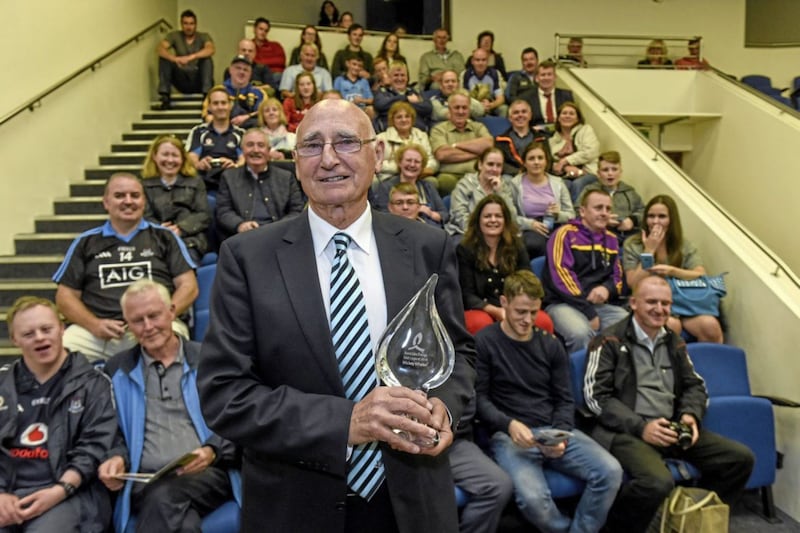BOOED off at half-time in their Leinster SFC quarter-final against Wexford. Humiliatingly hammered by arch-rivals Meath in the subsequent semi-final, conceding five goals in the process.
2010 seemed another bad year for the Dublin senior footballers, but it turned out to be the making of the great team.
In ‘Love of the Game’, the story of Mickey Whelan - ghost-written by Brian Barry and published by Hero Books - the legendary coach looks back at the moments which transformed the Dubs from serial losers to arguably the greatest Gaelic football team ever.
That 5-9 to 0-13 Leinster semi-final thrashing by the Royals was undoubtedly a major turning point for Dublin, but Whelan points to earlier meetings with three Ulster counties - Armagh and Tyrone, the latter in both the League and the All-Ireland qualifiers, and also Monaghan, importantly in pre-season.
There were no qualifiers in Whelan’s playing days, but they weren’t always good games for modern Dublin, he reckoned:
‘Of course, the backdoor did have its drawbacks for Dublin in more modern times….the team that Pat Gilroy and I inherited played their best football in the Leinster Championship – when there was a safety net in case the team tripped up.
‘Once that safeguard was removed, however, the same Dublin team didn’t last long in the All-Ireland series.
‘When I played championship, you had to win. If you didn’t win, you were gone. When it’s knockout football, every game you go out to play is a final. And you had to treat it like that. ‘You only find out what a team is made of when the chips are down.’
In 2010, everyone involved with the Dublin team knew they had to toughen up mentally. And that summer an opportunity presented itself. Another Meath championship win over Dublin. A bad day at the office all around sent Dublin hurtling for the qualifiers.
This was an alien concept for the Dublin team, after winning five consecutive Leinster titles. But in hindsight, it might have been just the tonic.
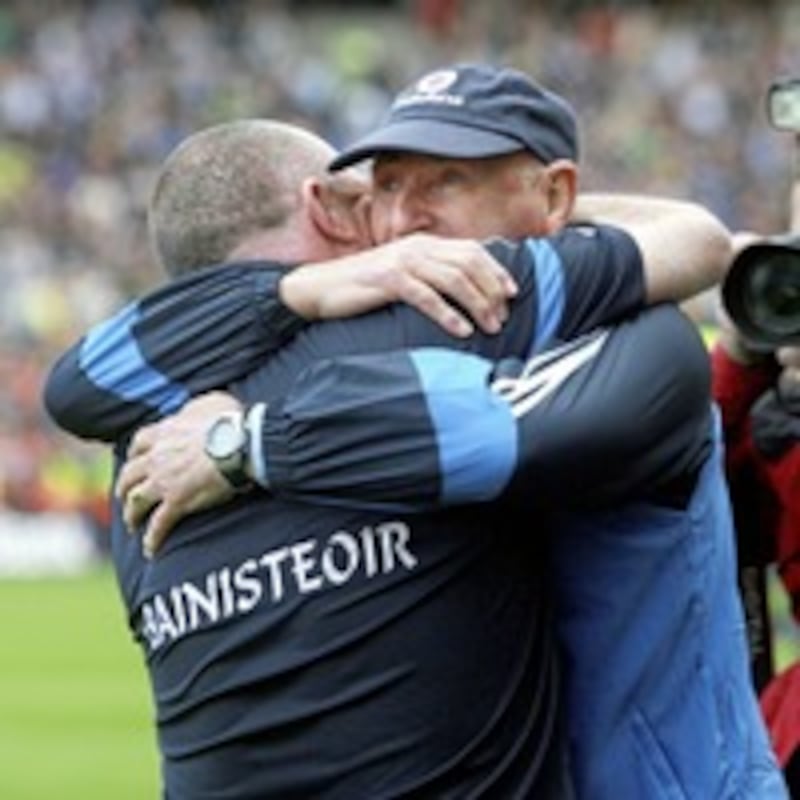
Mickey Whelan embraces Dublin manager Pat Gilroy after the 2011 All-Ireland SFC triumph
Dublin were forced to play with their backs against the wall in the qualifiers. Wins over Tipperary, Armagh and Louth got them back on track, and into an All-Ireland quarter-final. Not only that, however. It forced Dublin to play with no safety net for the entire summer.
The off-season in 2009 was a fruitful one from Dublin’s perspective. As explained, Pat Gilroy and Mickey Whelan met with every player individually to air out any issues, and plan for the coming year. If this was a three-year project in their minds – and it was – they needed 2010 to be a year of real progress.
During those few winter months, Dublin identified Monaghan as a team against whom they would get real benefit from playing. Monaghan were a tough, physical outfit. And Dublin figured that if they could front up and go toe-to-toe against them, they would be a match for anyone in the physical stakes.
The Dublin players were told before going out what they needed to do. It was not just one challenge game. Dublin played Monaghan several times over the course of a few months.
It suited Monaghan manager Seamus ‘Banty’ McEnaney too. He was looking at Dublin as a good football team and he wanted Dublin’s scalp for his own team’s confidence.
They weren’t necessarily looking for that physical battle, because that was already a strength of his team. With the Monaghan players, Banty didn’t have to worry about toughness.
‘We needed our guys to come out, knock the stuffing out of the opposition, and play some good football,’ explains Mickey.
‘We needed to expose our lads to a team like Monaghan. Banty’s brother, Pat McEnaney officiated the games. He was one of the top referees in the country.
There may or may not have been a word with him beforehand not to jump in too early, or be too whistle-happy!
‘We wanted our lads to find themselves in a real war of attrition. It was played at the wrong time of the year too… in lashing rain and on winter nights. If our lads were up for a battle in those conditions, they would have the appetite to battle anywhere.’
Dublin’s star forward Alan Brogan recalled: ‘They were physical games. Pat and Mickey were very focused on the mental side of things. The physical side of things was easy to get right. That was easy for Mickey.
‘But I think the mental side of things was where we were lacking the previous few years. And Monaghan in the winter can be a tough place to go to. That was the reasoning behind it.
‘They wanted to push us out of our comfort zone as much and as often as they possibly could… just to move the dial for people. Those were tough, no-holds-barred games up there. And I think both teams probably benefited from them. Players were going up there with a lot to prove. Monaghan were probably in the same boat. It was an interesting time for sure!’
That league campaign saw Dublin face Tyrone in the last game. Mickey Harte’s side had been All-Ireland champions in 2008, and won Ulster the following year. They were still one of the top teams in the country, but were fighting to stay in Division 1. Dublin were playing them away in Omagh.
It was a must-win game for Tyrone. But Dublin went up there and delivered. Bernard Brogan scored six points from play; his brother Alan bagged 1-1. Dublin won 2-14 to 1-11. Tyrone went down on the double. ‘Wins like that massively boost belief.’
When they met again in Croke Park in the All-Ireland quarter-finals, with Dublin having achieved a 0-14 to 0-11 win over Armagh en route, Whelan ‘knew that we had the beating of Tyrone, after relegating them earlier in that league. That quarter-final victory was a great win, particularly given that we had been thrashed by Meath in Leinster.
‘It showed the progress we had made in the space of the 18 months we had been with the panel. We had not won the Leinster Championship in 2010, but it was far more important to get to an All-Ireland semi-final, and still be in the hunt for the Sam Maguire Cup.’
Eventual All-Ireland champs Cork edged the Dubs out in the semi-finals - but 2010 had laid the strong foundations on which Dublin would build a phenomenal dynasty.
